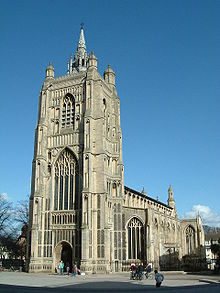St. Peter Mancroft Church, Norwich
| St Peter Mancroft, Norwich | |
|---|---|

St Peter Mancroft.
|
|
| 52°37′40″N 1°17′33″E / 52.62778°N 1.29250°ECoordinates: 52°37′40″N 1°17′33″E / 52.62778°N 1.29250°E | |
| Country | United Kingdom |
| Denomination | Church of England |
| Churchmanship | Central |
| Website | www.stpetermancroft.org.uk |
| History | |
| Dedication | Saint Peter |
| Administration | |
| Parish | Norwich, St Peter Mancroft |
| Diocese | Norwich |
| Province | Canterbury |
| Clergy | |
| Vicar(s) | The Rev'd Robert Avery |
| Laity | |
| Organist/Director of music | Jody Butler |
| Organist(s) | Julian Haggett |
St Peter Mancroft is a parish church in the Church of England, in the centre of Norwich, Norfolk. After the two cathedrals, it is the largest church in Norwich and was built between 1430 and 1455. It stands on a slightly elevated position, next to the market place.
St Peter Mancroft is a member of the Greater Churches Group.
The present building was begun in 1430, on the site of an existing church, and consecrated in 1455. It is an ambitious building, 180 feet long and ashlar faced with a tower at the west end. It is a Grade I listed building.
It has a Norman foundation dating from 1075, a 1463 font, a 1573 Flemish tapestry and medieval glass. The North transept displays a remarkable collection of church silver (one of the finest of any parish church in the country) including the Gleane and Thistle cups, as well as memorabilia associated with its most famous parishioner, the physician-philosopher Thomas Browne, author of Religio Medici (1642). The small lead-covered spire with flying buttresses was added by A.E. Street in 1896.
In 1850 two L-shaped trenches accommodating a number of acoustic jars were discovered beneath the wooden floor on which the choir stalls had previously stood. The earthenware jars were built into its walls at intervals of about three feet, with the mouths facing into the trenches.
St Peter Mancroft has a ring of fourteen Whitechapel bells in the western tower, eleven of which date from 1775 and the latest of which dates from 1997. St Peter Mancroft is important in the history of change ringing because in 1715, 5040 changes of Plain Bob Triples were rung for the first time, in 3 hours and 17 minutes, as recorded in an inscription in the tower. Subsequently, the first complete peals to the change ringing systems known as Grandsire and Stedman were also rung in St Peter Mancroft.
Supernatural folklore is linked to the bells in St Peter Mancroft. In the story "Our Bells" authored by Mark Knights, which featured in the undated booklet (circa 1894) "Norfolk Stories", Knight writes:
...
Wikipedia
